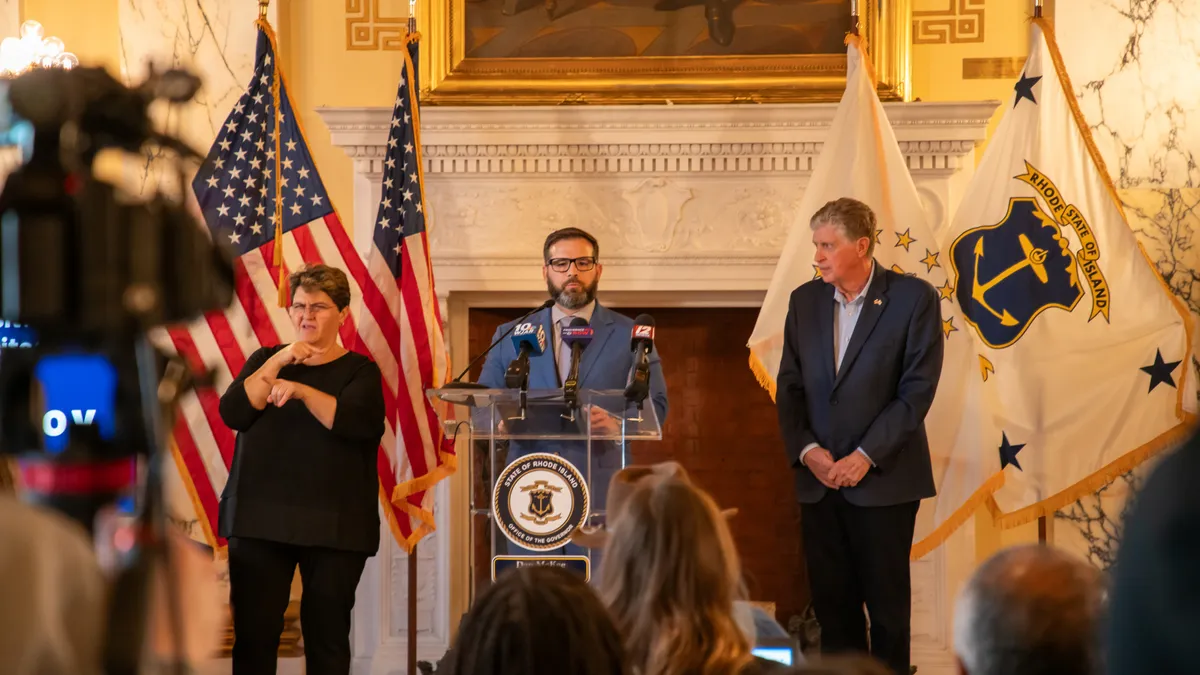As the need for equitable internet access becomes increasingly important to leaders, some cities are taking matters into their own hands and setting up municipally owned and operated networks.
When internet is treated as a public utility like gas, water or electricity, some city leaders say it can help residents find jobs, do homework at home more easily and connect easier to new technology like telehealth.
And while telecom companies and internet service providers (ISPs) have pushed back, arguing that they are in the best place to provide service and are doing what they can to roll it out citywide, the likes of Chattanooga, TN and Fort Collins, CO have taken the lead, while others such as Seattle are trying to follow in their footsteps.
"It doesn't matter who you are, what you look like, what you want to do as your business. Everybody gets it," Chattanooga Mayor Andy Berke said, referring to the city’s internet program, during an event this month in Washington, DC hosted by media company Axios.
Public benefits
Proponents of municipal internet argue the most compelling reason to treat it as a public utility is to ensure equitable access for all, regardless of neighborhood, to help address the digital divide.
That digital divide takes many forms, with cities struggling to provide equitable access across all neighborhoods, as some telecom companies are reluctant to build out the necessary infrastructure for fear of not being able to recoup their investment. By making it publicly-owned, advocates say, internet could become ubiquitous.
Already, work is underway. The Institute for Local Self Reliance (ILSR) said nearly 750 communities have carried out projects to some degree, and it has inspired others to try and follow their lead. Municipal internet can take many forms: from a full service where the city acts as the ISP, to the laying of dark fiber to encourage private leases, to public-private partnerships (P3s).
Advocates for municipal internet in Seattle formed the Upgrade Seattle group in 2014, looking to reduce the number of residents in the city that lack home internet from 17.2%. Co-founder Devin Glaser said the group came together to provide equal opportunities for internet access to neighborhoods that traditionally have lacked it.
“[Within] that gap, it's dramatically localized in communities that are already poor and marginalized: communities of color, recent immigrants, refugees, low-income communities,” Glaser told Smart Cities Dive. “When you think about what the internet helps you achieve, which is finding work, doing schoolwork, advancing in life, they're the ones who already need the assistance even more so.”
Often, advocates said, the price of getting an internet connection at home is what stands in the way. The city’s recently-released Digital Equity Study also showed income is still a barrier to access, while some residents cite other reasons such as confusing plan options and lack of speed.
Price has been a key driver for other communities, too. Ammon, ID has a government-led initiative to provide 1GBps to everyone for less than $60 a month, something Bruce Patterson, the city’s technology director, said could be replicable. "If we can do it in rural Idaho, you can do it in your communities," he said at last year’s Smart Cities Connect conference in Kansas City, MO.
Feasibility studies and strong public support have helped make municipal internet a mainstream issue in Seattle. (Glaser said two-thirds of residents are in favor.) A 2015 report by the Columbia Telecommunications Corporation (CTC) found it could be feasible in the city, especially through partnerships with public electricity utility Seattle City Light (SCL) and Google Fiber, and by establishing P3s with existing providers like Comcast and CenturyLink.
“The issue is: the market isn't solving the problem. I don't expect a for-profit company to take on an effort that will not make them money; that's not what they do, they are for-profit.”

Deb Socia
Executive director, Next Century Cities
Chattanooga took the approach of partnering with its public electricity utility, the Electric Power Board of Chattanooga (EPB), on its municipal internet initiative, which Berke said delivers speeds of up to 10 Gbps to every home and business in the city’s 600-square-mile area.
Those fast speeds have meant the city can think about new ways to grow its economy, Berke said, including by designating an innovation district to encourage new kinds of businesses to grow and invest downtown, with easy access to retail, restaurants and transit.
"The fiber, importantly, caused us to think differently about who we were,” Berke said during an event hosted by The Washington Post last year. “Chattanooga would have never said we could have a tech industry before we turned it on. After we turned it on, it wasn't just the backbone of that, it was a change in self-perception. We've been aggressive about that over the last 10 years."
And the city’s municipal internet has also helped it make its electricity grid smarter. Berke said that with a smart grid, the city receives 16 million data hits a day, up from 2 million a year before its municipal internet initiative. That smart grid can thus help pinpoint problems with electricity coverage and help get things up quickly again after a storm or other major outage.
Public policy
Opponents of municipal broadband have not gone down without a fight, with battles in state houses and at the Federal Communications Commission (FCC) over the issue. It came to the forefront in January 2015, when former President Barack Obama gave a speech in Cedar Falls, IA and said that “a community has the right to make its own choice and to provide its own broadband if it wants to.”
“And if there are state laws in place that prohibit or restrict these community-based efforts, all of us — including the FCC, which is responsible for regulating this area — should do everything we can to push back on those old laws,” Obama continued.
The following month, the FCC, under former Chair Tom Wheeler, ruled in a 3-2 decision to preempt state laws in Tennessee and North Carolina that prevented community broadband providers from expanding service, after petitions from EPB and the city of Wilson, NC. That decision, like Obama’s speech in Cedar Falls, was met with criticism, and it was overturned in court the following year.
“States are best positioned to understand the unique needs of their citizens and protect taxpayers from wasteful spending,” U.S. Sen. Deb Fischer, R-NE, said in a statement at the time. “The court’s decision upholds states’ rights to develop and implement their own fiscal and economic policies.”
Advocates took the view that instead of the FCC, states should be taken to task for prohibitive laws designed to stifle competition and prevent municipal broadband from taking root. In a statement at the time, Joshua Stager, policy counsel and government affairs lead for New America’s Open Technology Institute, said the FCC’s efforts before the court’s ruling highlighted “pernicious laws and gave momentum to repeal efforts in statehouses across the country.”
There is a patchwork of state restrictions and limitations on municipal broadband, with some of the largest including Washington state’s prohibition on public utility districts providing service directly to customers, and Texas’ ban on providing local telephone and telecommunications services.
But despite what could be onerous restrictions, some cities have still been able to break through. Colorado requires that jurisdictions put municipal broadband plans to voters as a ballot initiative, and after its voters approved such a plan, Fort Collins, CO is on the cusp of offering municipal fiber and high-speed internet. Officials with the city did not respond to requests for further comment.
Deb Socia, executive director of nonprofit Next Century Cities that works with cities to promote equitable internet access, said that localities have been relied upon to build all manner of public services, and if internet is viewed as such, this would be an extension of those efforts.
“Local communities have built infrastructure for years,” Socia told Smart Cities Dive. “Sewer systems, electrical systems, streets. They can do this work, there isn't a reason they shouldn't, and I think the other piece for these communities is the value of having a competitor in the marketplace.”
It could still be an uphill battle nationally, especially at the FCC. Commissioner Michael O’Rielly has given several speeches and public comments denouncing municipal broadband as a threat to the First Amendment, which he says would be infringed upon if governments control communications networks and act as content filters to what some could deem offensive speech. He also said it threatens competition among ISPs.
“Beyond flirting with a perverse form of socialism, municipalities’ overbuilding of private providers creates market inefficiencies, distorts competitive outcomes, encourages regulatory favoritism towards state-owned networks, and can be a waste of taxpayer money,” O’Rielly wrote in a blog post for the FCC.
Public (and private) opposition
Despite many cities and counties looking to put together a municipal broadband initiative of their own, there remains strong opposition from telecom companies, as well as concerns over cost.
While the CTC report found that municipal internet in Seattle is feasible, it also raised concerns about the price tag of the project, which is complicated by the fact that SCL cannot assume additional financial risk and so would need guaranteed payments to cover operations and maintenance.
And the need to raise money through a tax hike put San Francisco’s plans for citywide broadband on hold after polls showed that a revenue initiative would not have received the two-thirds support needed from voters. The initiative would have raised $1.7 billion over 25 years to help fund the project, which former Mayor Mark Farrell said last year would have been a big achievement. Farrell did not respond to requests for further comment.
“These bad investments crowd out other needs and, in the worst case, can put a city’s financial solvency at risk.”

Katie McAuliffe
Executive director, Digital Liberty
Price also put paid to similar ambitions in Memphis, TN, an initiative held up by opponents as an example of what could go wrong. The project was on the verge of bankruptcy by 2007 and was sold, leaving taxpayers and utility customers on the hook for the $20.5 million loss. In an opinion piece for The Hill, Katie McAuliffe, the executive director of Digital Liberty, cited other “civic horror stories” like Provo, UT, which spent $39 million to build out municipal internet, then sold it to Google for $1.
“Indeed, according to new data, over half of these municipal fiber systems fail to bring in enough revenue to cover their ongoing operating costs, bleeding red ink every day they operate and falling further and further into debt,” McAuliffe, who is also federal affairs manager at the conservative Americans for Tax Reform organization, wrote. “These bad investments crowd out other needs and, in the worst case, can put a city’s financial solvency at risk.”
McAuliffe also noted the rising costs for telecom companies that offer high-speed internet service, and how they must continue to invest just to keep up with demand. Those companies also have been investing heavily in local elections, typically supporting candidates opposed to municipal broadband.
“The cable and telephone companies that have built out the existing private Internet have spent over $1.5 trillion to do so,” McAuliffe wrote. “And by all reports they must keep spending to offer higher and higher speeds and support new technologies including the massive shift to mobile and wireless access that is currently underway.”
The FCC seems to agree that the private sector is helping close the digital divide and deploying broadband in a timely manner. A draft of its 2019 Broadband Deployment Report, which must be transmitted to Congress annually, said that there has been a 25% drop in Americans that lack access to fixed broadband internet, something chair Ajit Pai put down to the FCC “removing barriers to infrastructure investment, [and] promoting competition.”
Socia said she remains unconvinced. “The issue is: the market isn't solving the problem,” she said. “I don't expect a for-profit company to take on an effort that will not make them money; that's not what they do, they are for-profit.”




















